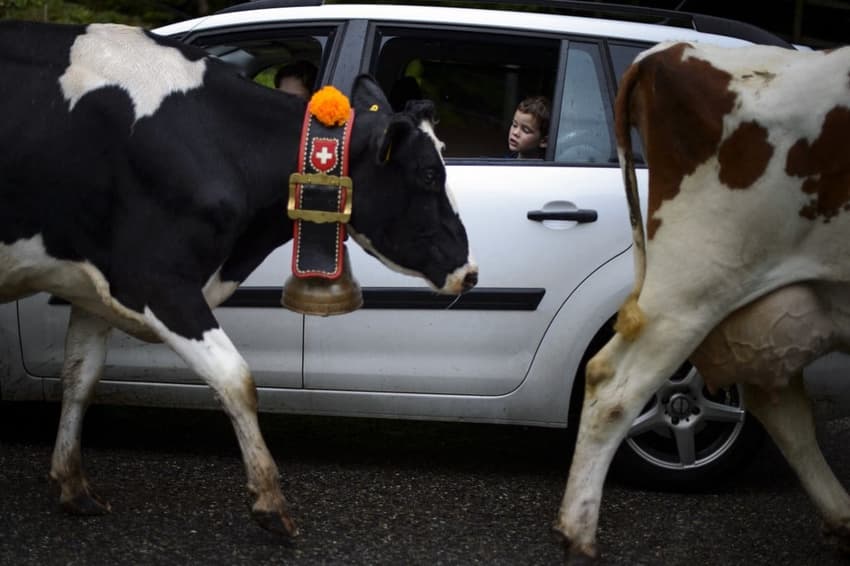Why your commune plays such an important role in your bid to become Swiss?

A peculiar aspect of Switzerland’s citizenship procedure is that it goes through the federal, cantonal, and communal levels. But it is the third one that has the most say in whether foreigners can be naturalised.
Meeting all the requirements for Swiss citizenship — such as length of residency, language skills, and integration — is just half the battle on the often long and winding road toward a Swiss passport.
READ ALSO: How to apply for Swiss citizenship
Even if all the criteria is fulfilled, you are not in the clear yet.
That’s because your application must be approved at the cantonal, municipal, and federal levels.
You start by applying at the naturalisation office in the canton where you live, following any specific rules that the canton may have beyond those required at the federal level (which are outlined in the link above).
If your application meets the cantonal requirements, it will be forwarded for approval to the competent federal authority, which is the State Secretariat for Migration (SEM).
Your application will then make its way back to the canton, which will leave the final decision on whether you can become Swiss up to the authorities in a village or town where you live.
Depending on whether you live in a city or a small community, this means either a municipal committee or a panel composed of local residents, will ultimately decide.
Why is this decision left to the locals?
This is due to the nature of Switzerland’s political and direct democracy structure, where people at the grass-roots level wield more power (at least in certain areas of life) than politicians sitting in Bern.
Another reason is that it is believed the local residents are in a better position to ‘judge’ whether foreigners living in their midst are integrated in community well enough to become Swiss — something that neither the cantonal nor federal authorities can ascertain.
So even if a person meets all the requirements set on cantonal and federal levels, each municipality autonomously decides on the naturalisation applications.
Under law, each commune can make its own rules on naturalisation, within the bounds of cantonal and federal legislation.
This is to say the communes play a key role in accepting or rejecting applications for Swiss citizenship, which — as a vast number of cases have shown — poses a risk of arbitrary or discriminatory decisions based on personal, rather than objective and unbiased, criteria.
(Mis)interpretation of integration
The role of local naturalisation committees is to decide whether candidates are sufficiently integrated into the life of their communities.
Integration, which includes participating in the commune’s activities, being a good neighbour, and respecting the local way of life — is very important in Switzerland and a decisive factor for naturalisation.
READ MORE: What does being 'successfully integrated' in Switzerland mean?
In some cases, a local police officer will invite a candidate for a chat, or visit the applicant at home to see how they live.
Or, the applicant may be asked to appear in front of several local residents who will ask questions to find out how much the foreigner knows about the community where they live and how active they are in its life.

Communal committee will examine your application. Photo by Alissa De Leva on Unsplash
On quite a few occasions, these questions were…questionable, as were the denied citizenship requests.
For instance:
In one well-publicised case in canton Schwyz, an Italian living in Switzerland for 30 years, saw his application for naturalisation turned down because he couldn’t answer a question about which animals live in adjacent cages in a local zoo.
And residents in a small village in canton Aargau voted against giving a Swiss passport to a Dutch woman, who had lived in Switzerland most of her life.
The reason: she repeatedly complained about the noise of cow bells in the village, the kind of behaviour which the locals found ‘annoying’ and not worthy of Swiss citizenship.
There are many more such examples, ranging from foreigners who walked around town in sweatpants, and a man who didn’t know the historic origin of the cheese dish, raclette.
Are these decisions really final?
Communal rulings can be appealed to a cantonal court, and all the way to the federal one if needed.
Sometimes the courts rule in favour of the rejected applicants.
Such was the case with the above-mentioned Dutch woman, who appealed the village’s decision to the cantonal court and won.
Comments
See Also
Meeting all the requirements for Swiss citizenship — such as length of residency, language skills, and integration — is just half the battle on the often long and winding road toward a Swiss passport.
READ ALSO: How to apply for Swiss citizenship
Even if all the criteria is fulfilled, you are not in the clear yet.
That’s because your application must be approved at the cantonal, municipal, and federal levels.
You start by applying at the naturalisation office in the canton where you live, following any specific rules that the canton may have beyond those required at the federal level (which are outlined in the link above).
If your application meets the cantonal requirements, it will be forwarded for approval to the competent federal authority, which is the State Secretariat for Migration (SEM).
Your application will then make its way back to the canton, which will leave the final decision on whether you can become Swiss up to the authorities in a village or town where you live.
Depending on whether you live in a city or a small community, this means either a municipal committee or a panel composed of local residents, will ultimately decide.
Why is this decision left to the locals?
This is due to the nature of Switzerland’s political and direct democracy structure, where people at the grass-roots level wield more power (at least in certain areas of life) than politicians sitting in Bern.
Another reason is that it is believed the local residents are in a better position to ‘judge’ whether foreigners living in their midst are integrated in community well enough to become Swiss — something that neither the cantonal nor federal authorities can ascertain.
So even if a person meets all the requirements set on cantonal and federal levels, each municipality autonomously decides on the naturalisation applications.
Under law, each commune can make its own rules on naturalisation, within the bounds of cantonal and federal legislation.
This is to say the communes play a key role in accepting or rejecting applications for Swiss citizenship, which — as a vast number of cases have shown — poses a risk of arbitrary or discriminatory decisions based on personal, rather than objective and unbiased, criteria.
(Mis)interpretation of integration
The role of local naturalisation committees is to decide whether candidates are sufficiently integrated into the life of their communities.
Integration, which includes participating in the commune’s activities, being a good neighbour, and respecting the local way of life — is very important in Switzerland and a decisive factor for naturalisation.
READ MORE: What does being 'successfully integrated' in Switzerland mean?
In some cases, a local police officer will invite a candidate for a chat, or visit the applicant at home to see how they live.
Or, the applicant may be asked to appear in front of several local residents who will ask questions to find out how much the foreigner knows about the community where they live and how active they are in its life.

On quite a few occasions, these questions were…questionable, as were the denied citizenship requests.
For instance:
In one well-publicised case in canton Schwyz, an Italian living in Switzerland for 30 years, saw his application for naturalisation turned down because he couldn’t answer a question about which animals live in adjacent cages in a local zoo.
And residents in a small village in canton Aargau voted against giving a Swiss passport to a Dutch woman, who had lived in Switzerland most of her life.
The reason: she repeatedly complained about the noise of cow bells in the village, the kind of behaviour which the locals found ‘annoying’ and not worthy of Swiss citizenship.
There are many more such examples, ranging from foreigners who walked around town in sweatpants, and a man who didn’t know the historic origin of the cheese dish, raclette.
Are these decisions really final?
Communal rulings can be appealed to a cantonal court, and all the way to the federal one if needed.
Sometimes the courts rule in favour of the rejected applicants.
Such was the case with the above-mentioned Dutch woman, who appealed the village’s decision to the cantonal court and won.
Join the conversation in our comments section below. Share your own views and experience and if you have a question or suggestion for our journalists then email us at [email protected].
Please keep comments civil, constructive and on topic – and make sure to read our terms of use before getting involved.
Please log in here to leave a comment.